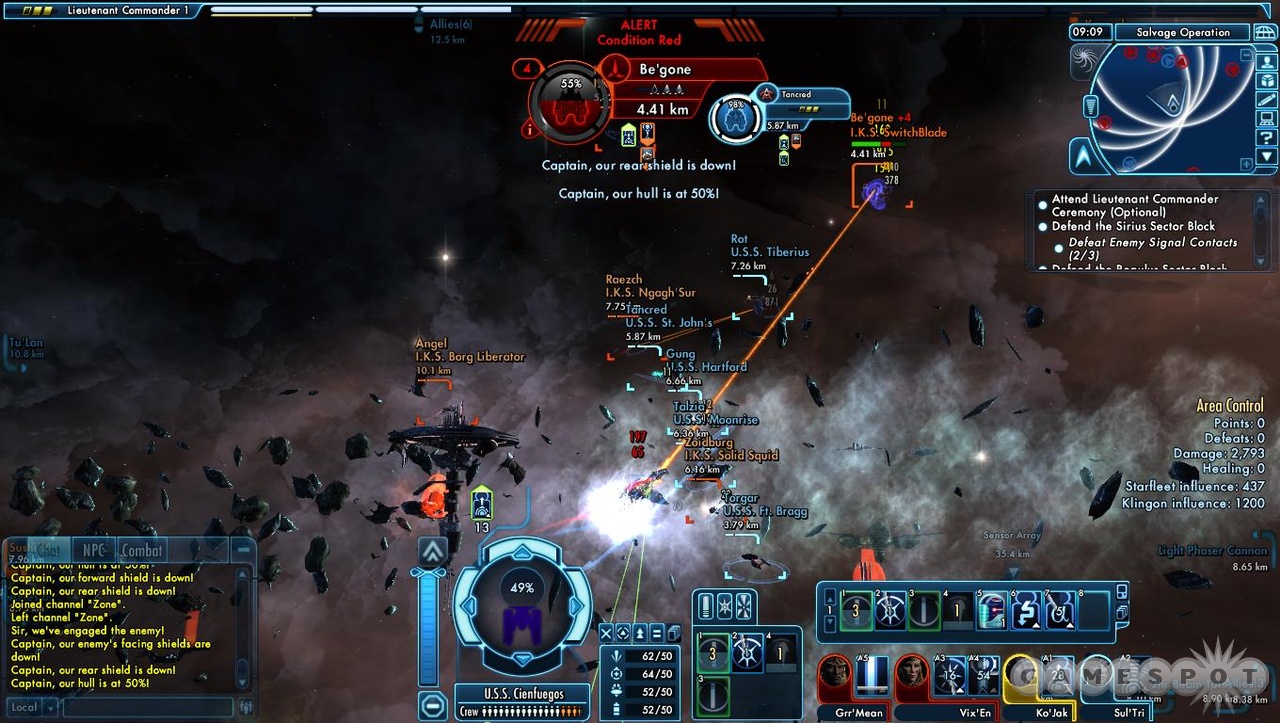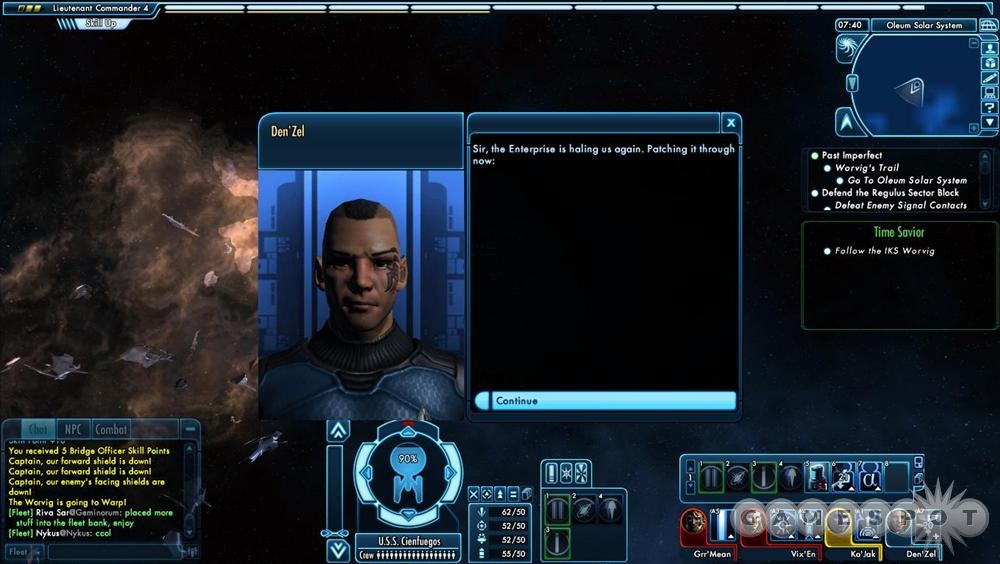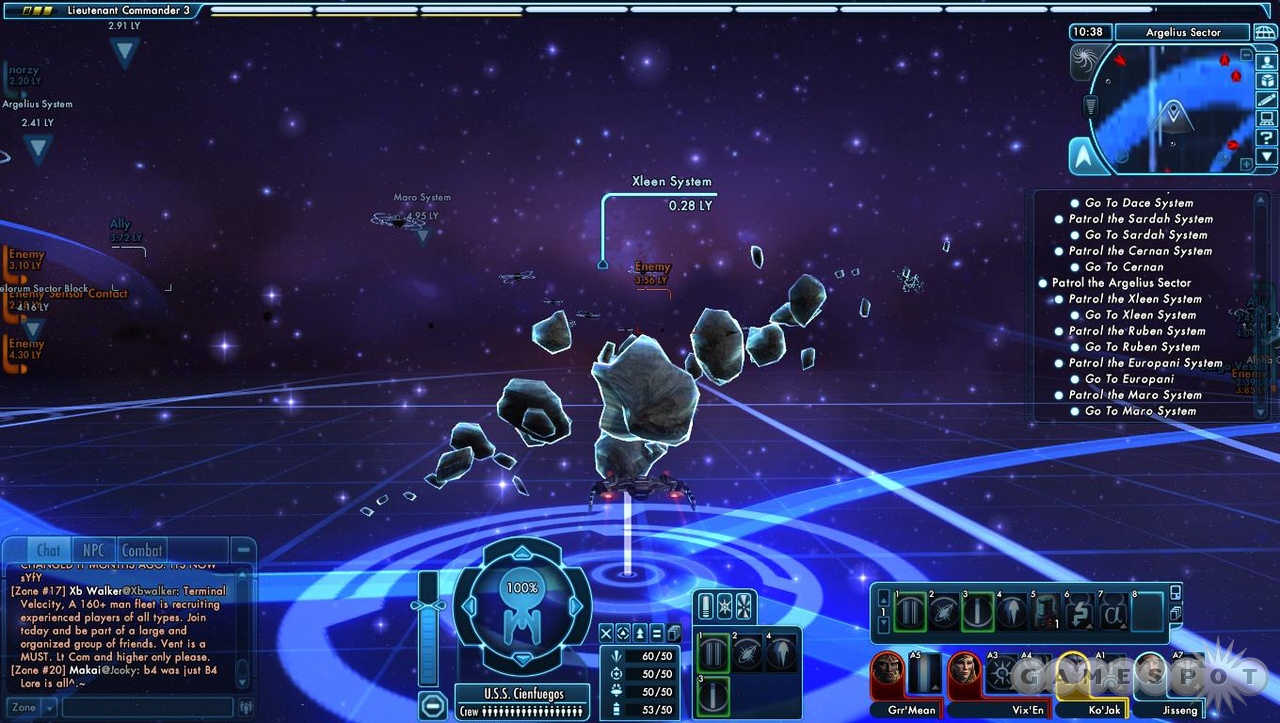Star Trek Online doesn't boldly go where no one's gone before. Instead, it mildly coasts along without much drama or excitement. Developer Cryptic Studios' latest online role-playing game is a "bare minimum" kind of experience, doing just enough to get by, but doing so without an ounce of flair and without the anything-can-happen-in-space buzz that makes the television shows and films such a delight. The game falls into a predictable rut quickly, relying almost solely on spaceship battles for entertainment and falling short almost everywhere else. Luckily, that combat can be fun, and in the best and biggest battles, your screen will light up with phasers and torpedoes, momentarily capturing the thrill of interstellar adventure. Unfortunately, those moments of epic wonder are mostly extinguished by underwhelming cookie-cutter missions, clumsy and unfulfilling ground combat, and shallow exploration that fails to capture the wonder and beauty of deep space. Star Trek Online is light, easy, and shallow, and those may not be qualities you're seeking from your next virtual universe.
The game may be disappointing, but character creation is a delight. As in Cryptic's previous games (Champions Online, City of Heroes), the toolset is highly flexible. It not only offers a healthy number of races from the Star Trek universe, but it also lets you create your own alien being from scratch. While you run about the game's space stations, you might see relatively normal-looking humans of the Captain Kirk variety, Vulcans sporting the pointiest ears you could hope for, or even odd monstrosities born of the player's creativity. When you first begin, you're stuck with the United Federation of Planets, though after you earn a few levels, you unlock the chance to join the Klingon Empire. If you were hoping to live and die with honor with the Klingons, however, you'll discover that the associated content is bare and unfinished. Missions drop off quickly, and you're stuck with player-versus-player content to fill in the enormous gaps.
And so you'll want to voyage with the Federation. As such, you and most of the players you see will follow more or less the same path to the end game. Not that you'll all coast about in the same ships. After you're done with the initial one-size-fits-all cruiser, you'll narrow your path by choosing a vessel with a more specific function. Cruisers are good for the usual tank role because they can take a heavy beating though they don't do the most damage; escorts are maneuverable and boast a lot of firepower but aren't all that sturdy; and science ships are good for healing, buffing, and other helpful support roles. You don't get nearly as much room to customize your ship's looks as you do with your on-foot avatar (and even less room if you're checking out the Klingon side of things), but the vessels look and feel like authentic Star Trek spacecraft, and you'll enjoy looking at your ship as you fly about on missions or even across the grids that represent deep space. You can even choose a look for your bridge and walk around on it. But it's too bad there's nothing to do there but hang about and wish you could relive all the great stories that Star Trek has served up over the years.

Unfortunately, you need to rely on your imagination to provide tension and interpersonal conflict. A number of different characters send you off on missions, but none of them are memorable, and the writing is as dry as the Yadozi Desert, as well as too often littered with distracting spelling errors. There are some interesting narrative tidbits and fun references to the lore scattered about, but nothing that will sweep you up, in spite of Leonard Nimoy's plaintive and all-too-infrequent voice-overs. (The other bits of voice acting are excruciatingly bad.) Most missions are online RPG standbys: Destroy some Gorn ships, beam someone aboard, and assist a friendly ship in combat. Some are even duller than that: Beam to a planet's surface, press some buttons, and beam back up. Perhaps the quiet moments would be a nice respite if the mission writing conveyed the tension of any given Star Trek away mission. As it is, like much of Star Trek Online, they're just dull.
In a typical play session, you'll navigate space by way of an overworld map on your way from one mission to the next. In Star Trek Online, space is a collection of sectors that are separated by loading screens, and they contain planetary systems that are also separated by loading screens. In addition, players do not all share the same virtual space (as we've seen in other space massively multiplayer online games like Earth & Beyond, EVE Online, and Jumpgate) but are separated by instances, which is a structure that should be familiar to you if you've played a Cryptic game in the past. It's a chopped-up vision of the galaxy that diminishes the mystery of space and the joy of exploration. You will be sent to explore unmapped systems, but all this entails is flying about and scanning anomalies until you reveal one to be a system; entering it initiates yet another poorly written, cookie-cutter caper. Easy to navigate is one thing, but Star Trek Online is divided into simple and digestible chunks. If you are a Trekkie new to online role playing, this spoon-fed design will help ease you into the game, but experienced explorers will miss the rush of discovery.

It's a good thing the space combat is fun in spurts, considering you spend so much of your time steering your ship around. Your shields are represented in the heads-up display by four arcs surrounding your ship; they take individual damage, which is a system not unlike that in other Star Trek games, such as 2002's excellent Bridge Commander. You'll want to protect your hull by keeping your shields up, all while whittling down your enemies' shields and then pounding them with torpedoes and other weapons. Attacks are supplemented by the various skills that you and the crew members earn as you level up, which may replenish shields, enhance damage, or allow for a quick getaway. Moments of true excitement are brief but can deliver an occasional rush. In large-scale fleet actions and player-versus-player shoot-a-thons, your screen will explode with color (and your speakers will explode with the pew-pews of disruptors). This is Star Trek Online at its best. The fun is plain and short lived, but it's rewarding to work with other players to bring down a resilient battle cruiser or a squadron of pesky PVPers.
Most of the action is of a much smaller scale, however. If you stick to missions meant for your level, Star Trek Online is a cakewalk. You can get through most battles by flying circles around enemies while hammering your space bar to fire weapons, and activating abilities from time to time. There are occasions where you'll need to take a bit more care, but even then, you'll need not fear defeat. There is no death penalty whatsoever--you just respawn and reenter the fray, no worse for the wear. The lack of a death penalty may sound appealing if you have dreaded memories of returning to your corpse in EverQuest, but here, it just makes an easy game even easier. Few fights offer the down-to-the-last-second kind of tension you'd hope for, and success is so inevitable that victory often rings hollow. You're just going through the motions without having to exercise the strategies you'd employ in the larger fleet actions.
Ground missions offer the chance to break up any potential tedium, but away team combat is a cobbled together mess. The thing is, some of the ideas applied to planetary combat are actually quite good. You can flank enemies to do extra damage, and the weapons and kits that you equip determine some of the skills you use. Even better, you're accompanied by multiple officers from the crew you've accumulated, and you can equip them with various pieces of armor, shields, and weapons. But these might be the dumbest AI-controlled cohorts you've seen in years. They tumble and jump around for no reason, stand in the middle of fires only to die, or get stuck running in place because they can't figure out how to get around a crate. Your enemies are cut from the same intellectual cloth, so don't expect a challenge--just a chaotic jumble of AI-controlled nitwits shooting at each other while you stand in place tapping number keys. Every so often, you need to use a healing item (you can pet a Tribble for a bit of psychosomatic soothing), but most of the time, fighting on the ground is just as easy as fighting in space. This makes the ability to pause combat for a brief time to organize the chaos a real head scratcher--an intriguing idea that's ultimately pointless considering the total lack of challenge and depth on the ground.

You can, of course, bring a few friends along if the AI's ineptitude gets too frustrating. Should you replace any away team members with a real player, you can expect an even easier time of things, though in space, it can be fun to team up and head to battle en masse. But Star Trek Online isn't an I've-got-your-back kind of game. Here, Cryptic takes another cue from its previous RPGs by making the game easy to play on your own and encouraging ragtag groups to come together only when necessary. You can also join a fleet, which is the game's version of a guild. You need to troll the chat channels for a fleet because there is no built-in fleet search, but there's no shortage of recruiting fleets or recruits at the moment. The tense and not-always-respectful chatter of the main sector chat channels will have you seeking refuge in your own fleet's channel as soon as you join one. Or you may, at least, wish that the game had a specific help channel for players sorting out some of the more convoluted aspects of travel and leveling.
You aren't always fighting or flying from mission to mission. You need to visit a starbase from time to time, whether it be to unload excess inventory or to shop for a new weapon or deflector dish or whatnot. Star Trek Online's economy and inventory management aren't complex, but there are a number of different currencies used in various ways, which is an artificial way of making the game seem more complex than it really is and unnecessarily convoluted. Eventually, you discover that you can buy most decent items for credits at the exchange, which is the game's version of an auction house. However, there are really no auctions, so there is no bidding--just outright sales. Furthermore, the exchange is a pain to use. The meager sorting options don't work properly, so you have to type in very specific search parameters if you want to narrow results down to a workable list. You also spend time on bases customizing your ship, requisitioning new officers, or paging through various skills you can purchase for your officers, which is another process that seems overly convoluted for no apparent reason.
Star Trek Online doesn't always capture the spirit of the franchise, though there are some aspects that do succeed at tapping into a fan's pleasure centers. There's the music of course--the rousing French horn themes that signify the great expanse of deep space. And then there are the clicks and whirrs of scanners and the satisfying, not-quite Majel Barrett drone of your onboard computer. The visuals do their best to keep up, and ships and character designs are detailed enough to make most Trek fans happy. Space is lovely in the way space often is in such games, with the foreground dotted with asteroid fields and glowing nebulas wafting in the distance. When you are out of your ship, the game doesn't look so grand, what with texture pop-in, erratic and sometimes awful animations, and occasional bugs, like disappearing walls.

Those aren't the only glitches you're likely to come across while playing Star Trek Online. Bugs are hardly uncommon in online RPGs during their launch period, though most partially compensate for them with great depth and breadth--attributes this game isn't fortunate enough to possess. One broken large-scale group mission was recently fixed but only partially so; you might still spawn in as an enemy and be targeted (and of course killed) by friendly players. You might try to spend skill points only to receive an error a good portion of the time. We experienced frequent crashes during ground missions on one of our test machines, which is a problem that seems to be affecting ATI video card owners. Tutorial tips continue to pop up, and we've run into quests that couldn't be completed. Clearly, there are some problems here, but most of the issues aren't insurmountable. They're just distracting or annoying.
It isn't bugs that make Star Trek Online feel unfinished, however. It's the inherent shallowness. It's light, airy, and simple--attributes that might attract you at first but only let you down when you find that the game is more boring than bold. Some of the flaws will improve in time; MMOGs are, by their very nature, evolving creatures. Other flaws--the poor ground combat and oddly disconnected nature of the universe--are threaded into the core design and less likely to see improvement. For now, be wary of Star Trek Online. The prospect of epic space combat may seem tempting, but a smattering of entertaining battles are merely oases amongst the monotony. Star Trek Online is a shell, lacking the substance and the style that the franchise so rightfully deserves.